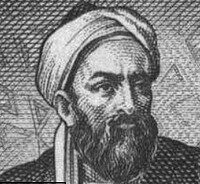Abū Rayḥān Muḥammad ibn Aḥmad al-Bīrūnī (September 15, 973 – December 13, 1048) was a Turkish polymath, scientist, physicist, anthropologist, psychologist, astronomer, chemist, critic of alchemy and astrology, encyclopedist, historian, geographer, traveller, geodesist, geologist, pharmacist, philosopher, theologian, scholar and teacher, and he contributed greatly to all of these fields.
Biruni (973-1043) born in Khwarezm / Uzbekistan.
Anthropology, Astronomy, Chemistry, Comparative Sociology,
Geodesy, History, Geography, Natural Sciences, Mathematics,
in Medicine, Philosophy, Pharmacology, Physics, Psychology
known for his work.
Abu Reyhan El Biruni (973–1048). (Uzbekistan) Suburb of Kas /Birun 973, Rey 955 (?), Gilan 995, Kas 997, Bukhara, Jürcan 999, Harizm (Kas and Gürgenc) 1003, Ghazni 1017-1050, Kabul, Kashmir and probably Thanesar via Punjab Travel to India (accompanying Mahmud of Ghazni’s conquests) to : Universal genius, astronomer and geographer (hermeneutical) Indologist and philosopher. Hezarfen (very knowledgeable) from Khwarezm, who first came to the fore in the palace of the Khwarazm shahs in Ürgenç (today in the borders of Turkmenistan) and then in the Palace of Mahmud of Ghazni in Afghanistan. His work in astronomy, geodesy, history and the social sciences has made him the greatest scientific thinker of the period between Antiquity and the European Renaissance. Astronomy, Mathematics, Natural Sciences, Geography and History. Biruni traveled from Ghazni to Hind between 1017 and 1030. In 1030 he published the book of Hind.
| “I have begun with Geometry and proceeded to Arithmetic and the Science of Numbers, then to the structure of the Universe and finally to Judicial Astrology, for no one who is worthy of the style and title of Astrologer who is not thoroughly conversant with these for sciences.” |
| 25 WAYS TO FREEDOM
According to the Hindu philosophers, liberation is common to all castes and to the whole human race, if their intention of obtaining it is perfect. This view is based on the saying of Vyâsa: “Learn to know the twenty-five things (I. e. The twenty-five elements of existence) thoroughly. Then you may follow whatever religion you like; you will no doubt be liberated.” Alberuni’s India |
| THE NATURE OF TIME
Some people maintain that time consists of cycles, at the end of which all created beings perish, whilst they grow at their beginning; that each such cycle has a special Adam and Eve of its own, and that the chronology of this cycle depends upon them. Other people, again, maintain that in each cycle a special Adam and Eve exist for each country in particular, and that hence the difference of human structure, nature, and language is to be derived. Other people, besides, hold this foolish persuasion, viz that time has no terminus a quo at all. Now, personal observation alone, and conclusions inferred therefrom, do not prove a long duration of the human life, and the huge size of human bodies, and what else has been related to be beyond the limits of possibility. For similar matters appear in the course of time in manifold shapes. There are certain things which are bound to certain times, within which they turn round In a certain order, and which undergo transformations as long as there is a possibility of their existing. If they, now, are not observed as long as they are in existence, people think them to be improbable, and hasten to reject them as altogether impossible. |
| “The great differences between ideas and beliefs are evidence of the vitality of the world.” |
| “Diversity in people’s thoughts and beliefs is the source of development and well-being in the world.” |
| “Maester Abu’s-Sahl (may Allah have mercy), when I saw those works revisited and the issue was exactly as I stated, he encouraged me to write what I know about Indians. This information can be useful to those who want to reject the Indians or become a capital for those who want to live with them.
I started this job, obeying the master’s order. While writing what I know, I avoided slander the enemy. Also, as a Muslim, I did not hesitate to quote long quotations from Indian texts at points that I thought would contribute to enlighten a subject. Even if the content of some of the quotations is clearly seen as blasphemy and may be rejected by the passengers of the right path (Muslims), we can only say, “This is the belief of the Indians and they are most worthy of defending this belief. |
|
“We have here given an account of these things in order that the reader may learn by the comparative treatment of the subject how much superior the institutions of Islam are, and how more plainly this contrast brings out all customs and usages, differing from those of Islam, in their essential foulness.” |
| “Verifying All That the Indians Recount, the Reasonable and the Unreasonable”or “The book confirming what pertains to India, whether rational or despicable”) |
Further Quotes




















